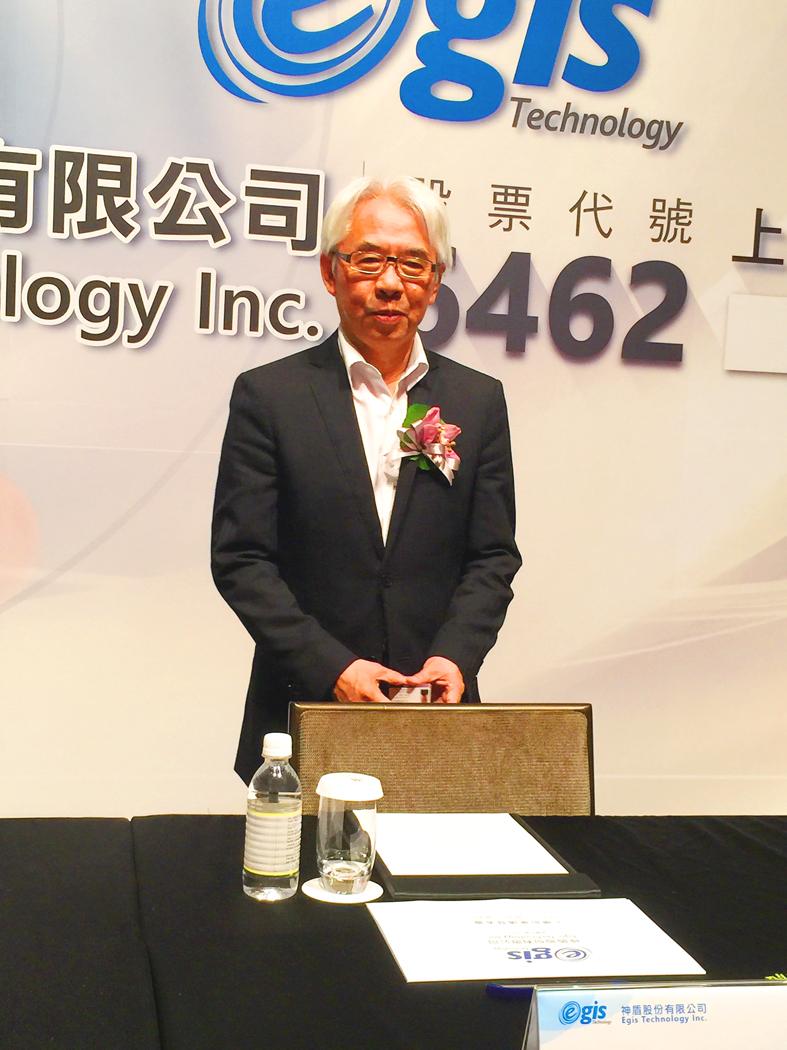Fingerprint sensor supplier Egis Technology Inc (神盾) expects revenue this quarter to continue declining quarter-on-quarter, as stagnant smartphone sales are still curbing demand for chips, a company executive said yesterday.
Wafer supply constraints also remain an issue and could continue to weigh on the company’s business this year, Egis said.
The company said that it was unable to fulfill some rush orders due to a widespread shortage of key components in the second half of last year.

Photo: Vanessa Cho, Taipei Times
Egis sources 8-inch wafers from Taiwan Semiconductor Manufacturing Co (TSMC, 台積電) and Samsung Electronics Co.
The company said that it is evaluating the possibility of adding a third supplier.
Egis would also begin sourcing 12-inch wafers this year, but it will take time for customers to adopt the new chips, it said.
“The [COVID-19] pandemic has significantly affected the company,” Egis chief financial officer George Chang (張家麒) told a videoconference. “We still cannot scale up revenue in the first quarter. It is likely to decline annually.”
On the demand side, order visibility is vague due to supply chain chaos, Chang said.
Short supply of components used in smartphones such as power management ICs could also defer shipments, he said.
Egis, which counts Samsung as one of its major clients, saw revenue drop 40 percent year-on-year to NT$1.19 billion (US$42.05 million) last quarter, the lowest in two-and-a-half years.
Total revenue last year shrank 15 percent to NT$6.22 billion, missing the company’s guidance of double-digit percentage growth as the pandemic dented smartphone demand.
The company reported its weakest quarterly net profit in two years last quarter at NT$4.4 million. Net profit nosedived from NT$203.07 million a year earlier.
Gross margin fell to 38 percent last quarter from 46 percent a year earlier, as Egis shipped more capacitive fingerprint sensors than optical fingerprint sensors, which have a higher margin.
Total net profit last year contracted 26.68 percent to NT$632.56 million, compared with NT$862.68 million a year earlier. Earnings per share tumbled to NT$9.1 from NT$12.6 in 2019.
To regain revenue growth, Egis is expanding its product portfolio to supply versatile chips used in smartphones, including lower-priced chips, Chang said.
The company is developing new chips, including 3D time-of-flight (TOF) sensors, which are used for facial recognition in smartphones, Egis chairman Steve Ro (羅森洲) said on Thursday last week.
Egis hopes to capture early business opportunities from Android smartphone makers, who are likely to follow Apple Inc in using TOF technology. Apple’s iPhone 12 Max is equipped with a TOF sensor.
Egis is also developing new chips used in “true wireless” earphones, Lo said.

UNCERTAINTY: Innolux activated a stringent supply chain management mechanism, as it did during the COVID-19 pandemic, to ensure optimal inventory levels for customers Flat-panel display makers AUO Corp (友達) and Innolux Corp (群創) yesterday said that about 12 to 20 percent of their display business is at risk of potential US tariffs and that they would relocate production or shipment destinations to mitigate the levies’ effects. US tariffs would have a direct impact of US$200 million on AUO’s revenue, company chairman Paul Peng (彭雙浪) told reporters on the sidelines of the Touch Taiwan trade show in Taipei yesterday. That would make up about 12 percent of the company’s overall revenue. To cope with the tariff uncertainty, AUO plans to allocate its production to manufacturing facilities in

TAKING STOCK: A Taiwanese cookware firm in Vietnam urged customers to assess inventory or place orders early so shipments can reach the US while tariffs are paused Taiwanese businesses in Vietnam are exploring alternatives after the White House imposed a 46 percent import duty on Vietnamese goods, following US President Donald Trump’s announcement of “reciprocal” tariffs on the US’ trading partners. Lo Shih-liang (羅世良), chairman of Brico Industry Co (裕茂工業), a Taiwanese company that manufactures cast iron cookware and stove components in Vietnam, said that more than 40 percent of his business was tied to the US market, describing the constant US policy shifts as an emotional roller coaster. “I work during the day and stay up all night watching the news. I’ve been following US news until 3am

COLLABORATION: Given Taiwan’s key position in global supply chains, the US firm is discussing strategies with local partners and clients to deal with global uncertainties Advanced Micro Devices Inc (AMD) yesterday said it is meeting with local ecosystem partners, including Taiwan Semiconductor Manufacturing Co (TSMC, 台積電), to discuss strategies, including long-term manufacturing, to navigate uncertainties such as US tariffs, as Taiwan occupies an important position in global supply chains. AMD chief executive officer Lisa Su (蘇姿丰) told reporters that Taiwan is an important part of the chip designer’s ecosystem and she is discussing with partners and customers in Taiwan to forge strong collaborations on different areas during this critical period. AMD has just become the first artificial-intelligence (AI) server chip customer of TSMC to utilize its advanced

Six years ago, LVMH’s billionaire CEO Bernard Arnault and US President Donald Trump cut the blue ribbon on a factory in rural Texas that would make designer handbags for Louis Vuitton, one of the world’s best-known luxury brands. However, since the high-profile opening, the factory has faced a host of problems limiting production, 11 former Louis Vuitton employees said. The site has consistently ranked among the worst-performing for Louis Vuitton globally, “significantly” underperforming other facilities, said three former Louis Vuitton workers and a senior industry source, who cited internal rankings shared with staff. The plant’s problems — which have not